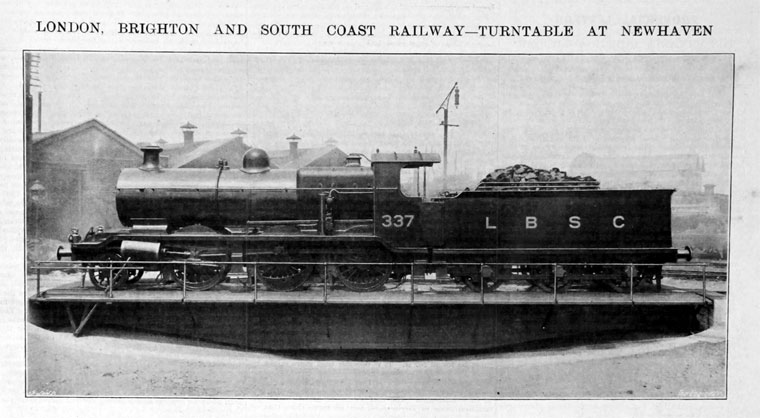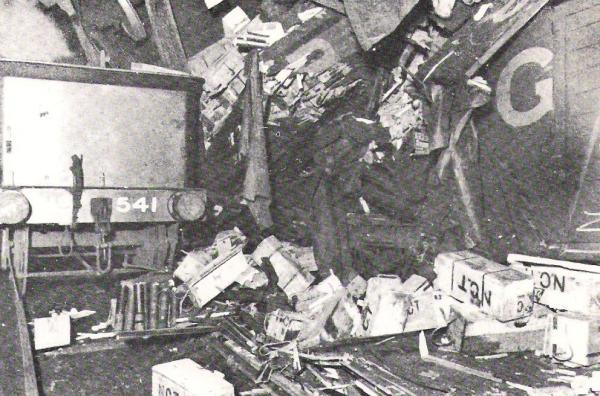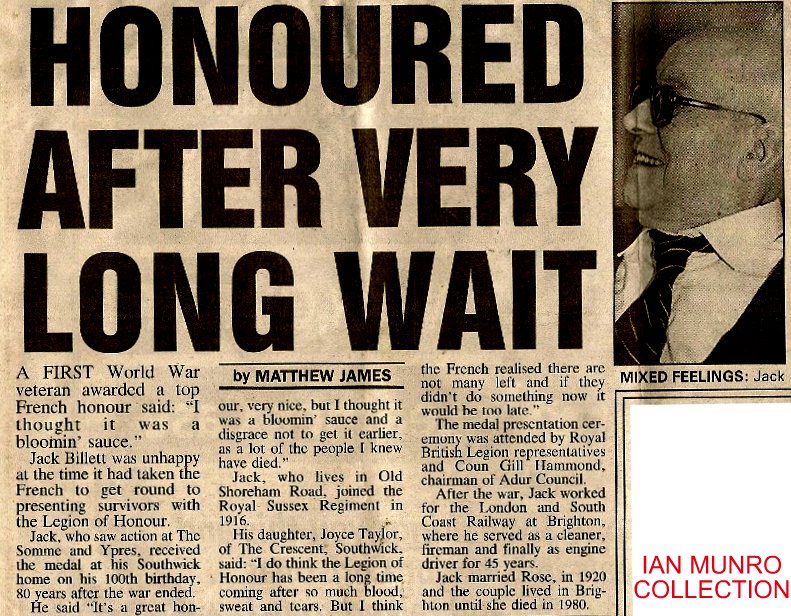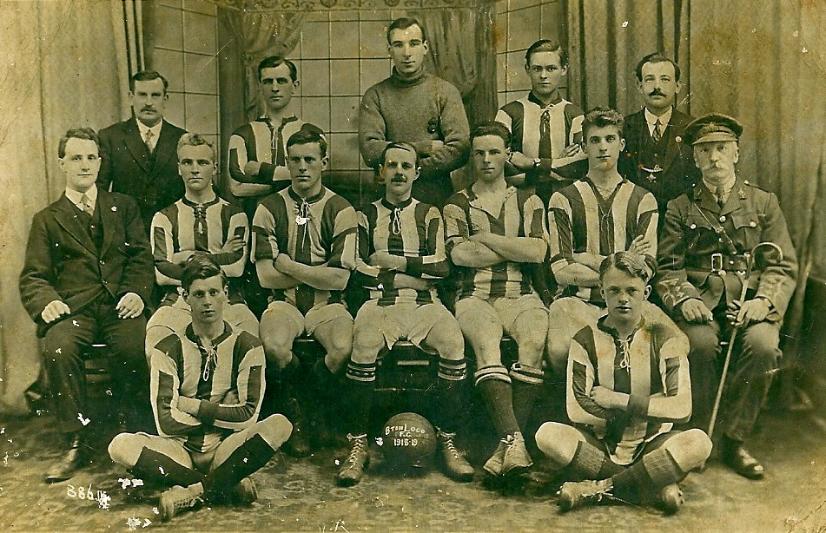
Following strong pressure by A.S.L.E.& F., the eight hour day
agreed with the Board of Trade, to operate from the 1st January 1919
Inaugural meetings of District Council held.
1918 brought the full explanation, in the conferences held between the Government and representatives of trade unionism on the further combing-out already alluded to. The conferences, two of which were addressed by the Prime Minister, were to explain the necessity of getting 420,000 more men for the Army and Navy, and in regard to footplatemen, Mr. Bromley had already expressed the impossibility of further diluting the locomotive workers, who had lost 11,000 of the regular workers since 1913. Substitution was the phrase of the day, but it is impossible to substitute drivers and firemen on railway work. Young boys were then being employed with men long past the retiring age.
Young lads on shunting engines who had a difficulty in making themselves seen, who have to climb to look through the eye-glass, and have to stretch to look over the side-door on some of our engines, being jointly responsible with the driver for safe working “
It should be further noted that during this period of draining of men from essential industries for the fighting fine, an orgy of luxury spending was rampant in England. The war profiteer had become a real and plentiful person, numbering thousands, and all anxious to display outwardly their new wealth. Motor-cars were booming so much that one popular make was advanced £100 in price per car in a single week. Diamonds and fur-coats were the rage, and the jeweller and the furrier never had such years. Women especially were lavish in their expenditure, and a riot of luxury spending marked national life.

PHOTOGRAPHER UNKNOWN
Railway accident on the
L.B.S.C.R.
REDHILL TUNNEL

PHOTOGRAPHER UNKNOWN
THE SECENE INSIDE REDHILL TUNNEL
A triple collision occurred in Redhill tunnel (Sand-hole) during the early hours of 18th April, 1918, when Driver Roberts and his Fireman Howard, when their K Class 2-6-0 engine No. 340, were working the 2.10 a.m. up goods ex-Eastbourne (59 wagons and a brake van) had been stopped at the advance starting signal after passing Earlswood Junction Signal box, and on getting away the Driver Roberts snatched the train, breaking a coupling. Driver Roberts and his engine and its section of the goods wagons passed through the tunnel, where it was followed by the remainder of the wagons, which came to rest some hundred yards from the entrance, where they were run into by Driver Sharp’s Class C2X engine No. 541 at the head of the 11.40 goods ex-Portsmouth (38 wagons and a brake van).
Before any warning could be given Driver Hunt and his Fireman Mapp, was approaching with Class C2 No. 536, with the 4.00 a.m. Lillie Bridge – Newhaven ammunition train (39 wagons) entered the tunnel on the down line under clear signals and crashed into the wreckage. The of this train was derailed and a length of the tunnel filled to the crown with highly explosive debris but possibly through lack of air nothing caught fire, and by working day and night breakdown gangs cleared the lines in forty hours. No one was seriously injured, and 26 wagons completely destroyed. At the inquiry, Guard Austin of the Eastbourne goods and Signalman Tawes came in for much adverse comment, the former for sitting in his van inside Redhill tunnel from 5.04 to 5.13 a.m. without attempting to protect his train, and the latter for passing no. 340 and its part- train to star lane section without observing the lack of a brake van or red tail lamp. Either, by rapid action and obeyance of the Company’s rules, could have minimized or stopped the accident.
1918 A.A.D.
At the 1918 A.A.D. in late May and early June. The Brighton and Doncaster delegates
attempted to align the Society with the desire for a Allied victory (in the Great War) but was
ruled out of order.
Taken from "Driven by ideals"
Extracted and adapted from
Newhaven Branch Meeting
Sunday Aug. 25th 1918
A letter was received from Bro. J. Enves with copy of letter from Mr. Jackson with regards to delegation business, the following resolution was passed in reference to the same.
"That this meeting considers Mr. Jackson's reply to the delegation very unsatisfactory, and urge the delegates to press for an interview with Mr. Jackson if unable to obtain the same, to ask for an interview with the Hon Board of Directors. Bro. J. Newman's case then discussed and the Secretary said that he was expecting an interview with Mr. Moore re the same, the meeting thought it advisable to write to Mr. Moore direct for an interview, and to leave the matter in the hands of the Secretary.”
Carried.
SLIDING SCALE FOR WAR WAGES
A sliding scale arrangement should apply to war wages, an acceptance in September, 1918, of the scheme advocated by the Society in September of 1916. It was to operate to follow the increased cost of living upwards, but not to reduce the war wage below 30s. in any circumstances. This was the second notable gain, and thirdly certain pledges to the Society, as to after conditions, were renewed and enlarged upon. The flat rate figures of 5s. and 2s. 6d. were not increased, except that the flat rate advance should be paid back from August 5th, as being near the date of application. On September 19th a further and final conference was held at the Board of Trade without agreement or further offer. The sub-committee therefore returned to the full Executive, and whilst consideration was being given to the position, it was learned that the N.U.R. had accepted the settlement. That distinctly altered the outlook, and the question to face was of using the Society's strength alone to enforce something better, or to realise that the pace had been forced to the utmost limit the War Cabinet would concede, emd to accept.
The latter course was adopted. It was agreed to accept the position under protest, and the terms of settlement were not signed by the Society. The terms were as follow:
5s. per week increase to those over 18 ; 2s. 6d. to those under 18 ; to date from Monday, September 23rd, with back payment from August 5th, a sliding scale arrangement to be set up at once to revise the war wage on every increase of four or five per cent., taking 1 lO per cent, in its relationship to 30s. as the basis.
After the close of negotiations the Executive passed the following resolution on September 20th :
" That we accept under strong protest the ultimatum of the War Cabinet of the award of 5s. and 2s. 6d., and we appoint a sub-committee of the Executive Council to meet representatives of the Government with a view to consider, and if possible arrange for, a basis for a sliding scale, such as was offered by the Society to the Railway Executive in September, 1916, and which has now, after all this time, been accepted. We feel that the offer of the Government does not cover the increased cost of living peculiar to our members. We, however, advise our members to accept it, along with a suitable sliding scale, if such can be mutually agreed upon, and to conserve their strength for that fight with the Government and the profiteering classes which will take place in the near future."
The settlement gave little satisfaction, and indeed was scarcely announced when trouble of a serious character began. The traffic men at Llantrisant struck on September 20th, and the Society members followed. On Saturday the 21st, and Sunday the 22nd, other stations followed suit in the South Wales district, and by Sunday night the men of both societies were out at Pontypool, Newport, Aberbeeg, and Severn Tunnel, with several other stations seriously affected, the strike even spreading as far North as Manchester and across the South east.
The Executive and General Secretary proceeded to Newport, where the General Secretaries of both societies addressed the strikers and advised a general resumption of work, repeating the same advice at a mass meeting at Cardiff. The strike closed in Cardiff the same night, September 25th, and all branches were telegraphed to resume duty, but they distrusted the telegram.
The General Secretary gave the Severn Tunnel men a written instruction to resume, but the Severn Tunnel men would not accept the note when it was conveyed to them, and waited for a personal assurance from Mr. Bromley. The train conveying him to London had to stop specially at Severn Tunnel Junction to enable him to assure the men before they would return.
Stratford was out, too, resuming on the 26th, but the South Western, Brighton, and South Eastern did not return until the evening of the 27th, after a great meeting on Clapham Common, from which Mr. Bromley headed a procession of seven hundred loco men through South West London to the South Eastern depot at Battersea, then on to the Brighton line depot, and finally to Nine Elms, the men resuming with the same solidarity as they began. That strike of September, 1918, was unconstitutional, spasmodic, and irregular, yet magnificent, and it gave great strength to the Executive in their negotiations.
The Executive had been summoned to London on August 26th to assist the members on the London Electric lines, and the position was reviewed with a deputation of the men. Meetings were arretnged, and on the morning of August 27th the General Secretary and Mr. Garrison, the Executive Committee representative of the electric men, made the following agreement with the Electric Companies :
1. That all members be reinstated without victimisation.
2. No women strikers to be punished in any way for striking.
3. The management to meet the Executive the next day to discuss outstanding grievances.
4. All strikers to be invited to resume duty at once.
In the conference on the following day many improvements were secured, making for quicker promotion to higher rates of pay, better terms for Sunday duty and overtime, improved supply of clothing, and several other considerations.
Extracted and adapted from
Newhaven Branch Meeting
Sunday Oct. 20th 1918
Correspondence was dealt with which included circular letters from Head office re the recent War wage increase, and the recent Railway strike, which explained the position of our members in reference to the same. Copy of report of Delegation meeting with our Officials at Brighton L. Billinton Esq., J.M. Jackson & E.S. Moore, was received from Bro. J. Enves.
The various items were discussed and the question of calling an open meeting in reference to the same. It was advised that the Secretary should write bro. J. Enves for further information in regards to the questions which had been brought up at the delegates meeting at Brighton, especially referring to the 8 hours per day and transfer of loco-men to the electric system, also with regards to the question of seniority, the question was also raised about making an application to be allowed to join the 1st class of the Company's Pension Fund, and it was pointed out that some men at the present time did not avail themselves to go into higher scales which they were entitled to.
The Secretary gave a report of an interview he had with Mr. Richardson at Brighton re Bro. Newman's case.
Extracted and adapted from
Newhaven Open Meeting
Sunday Nov. 3rd 1918
To discuss report of delegates meeting with Loco Officials at Brighton. There was a fair attendance of members also some N.U.R. members, it was agreed that Bro. A. Leonard should act as Chairman.
The correspondence was then read and considerable discussion arose on various points raised. It was agreed that the 8 hour per day work would be very acceptable if it could be obtained, but doubt was expressed as to it success at the present time.
Re transfer of Loco men to electric, the men thought that the older men who were displace should have the opportunity of transferring to the electrics without loss of pay. The men considered that to be a question to be dealt with by the General Manager on the Hon. Board of Directors, as regards seniority the men were of the opinion that seniority should could from the Fireman, a man was passed as fireman.
Re Pension Fund the men thought that if the pension age was brought down to 60 years instead of 65 as at present, would encourage men to go into the higher scales, the men present said that it would be a good thin if we were enabled to transfer to the 1st class,
The men present at the meeting expressed opinion that it would be more satisfactory if a delegate who was present came and gave report of the interview.
Newhaven Branch Open Meeting
Sunday Dec. 1st 1918
In reference to correspondence received from Head Office re 8hr negotiations, also re local matters that involved alteration. Dealing with the 8hr question it was proposed by Bro F. Sherwin and Seconded by W. Smith. That Bro. A. Leonard be delegate to the District Council meeting if convened (Carried).
The question of pilot men being booked on short hours on Saturdays to bring men on at 11.30 p.m. Saturday nights and causing these to work 11 to 11 ½ hours, the greater paid which was worked on Sunday,also men being booked on 10 hr days on Sundays, these matters were discussed and it was proposed that the care should be put before Mr. Moore. It was proposed by Bro. W. Goldsmith & Seconded by F. Sherwin. That the Secretary write to Mr. Moore asking him to grant an interview to Bro. F. Wilsmhurst and A. Leonard in respect of the same (Carried Unanimous). There being a further meeting at the Co-op Hall under the auspices of the Local Trades & Labour Council for the adoption of a Labour Candidate for Lewes division, the men present were invited to attend.
Newhaven Open Branch Meeting
Sunday Dec. 8th 1918
On the instructions from Head Office, to hear report and receive instruction re the 8hr movement.
Correspondence was first dealt with and Bro. Leonard who was elected delegate to the District Council member gave report of the meeting held at the Labour Institute, Fort Road, Bermondsey on Fri Dec. 6th 1918 our delegate said that Bro W. Stevenson our E.C. Member came to the delegate meeting after been negotiating with the government. He pointed out how Sir A Stanley had tried to get the question put off until after the election, our E.C. would not have it, and informed Sir A. Stanley that our men not wait until March for the 8hr to be brought into operation. Sir A. Stanley eventually agreed to meet our E.C. At Manchester & London and that they had agreed on Feb 1st 1919. after hearing the report of our delegate the following resolution was passed.
"That this open meeting for loco-men sincerely appreciates the firm stand made by the E.C. Of the A.S.L.E. & F. in their demand for the redemption of the pledge given to them by the Government in August 1917, which has resulted in the obtaining for Loco-men the 8hr per day.”
Moved by Bro. W. Goldsmith & Sec. Bro. J. Rye.
STORIES FROM THE SHOVEL
WE WON THE WAR..............................
..................BUT WE LOST OUR ENGINE
extracted from RTCS book on locomotives of the LBSCR
An humours incident happened on the evening of 11th November, 1918, Armistice Night,
which involve the crew of an Class E4 No. 500. The crew had just worked a van special down from London Bridge to Redhill and was standing in the down bay awaiting instructions as its return to New Cross, when the Station Master asked the driver into his office for a glass of beer to celebrate the ending of hostilities. The Fireman, a young lad of 17, was left in charge and after attending the fire and boiler he sat down on a luggage truck, ate his supper and fell asleep. In due course, the driver returned to find his his engine gone and his mate snoring gently away without a care in the world until roughly brought back to reality and 11.45 p.m. on the draughty Redhill platform. A hurried search failed to bring the engine to light and at first it was thought that there was a runaway on the main line, but after the Signalman on duty had proved this impossible, the search was broadened to include the S.E.& C.R.’s running shed. There the they found the engine simmering along side the Foreman's office, where it apparently been taken by a crew going of duty, although no evidence of this was ever found despite a lengthy inquiry by the officials of the two companies concerned. In the wrath of officialdom fell on the helpless Fireman, who was fined £3 for sleeping on duty, no special circumstances being found in his tender years, or in the 12 1/4 hours spent on duty prior to the incident.
Known L. B. & S. C. R. Enginemen who fell in the First World War
The following information comes from the National Railway Museum and does not indicate
the Loco Shed that they worked as
MOTORMEN
C.E. Howard, Sargeant.
A.S. Nevard, Private.
FIREMEN
C. Brown, A.B.
E.R. Gatson, Sapper
APPROVED FIREMEN (ENGINE CLEANERS)
W.H. Cook, Signaller.
A. French, A.B.
F.C. Hyson, Sapper
A. Minihane, Riffleman
ENGINE CLEANERS
H.C. AMONDSON, Private
R. Carey, A.B.
A. Colbarn, Sapper.
A.F.H. Dallaway, Gunner.
J. Elphick, Private.
A. Eustes, Private.
J. Francis, Private
C.E. French Private
J. Funnell Corporal.
E. Gibbons, Private.
E. Hall, Private.
F. Harmer, Sapper.
H. Heasman, Sapper.
S.A. Kimber, Sapper.
J.W. Laycock, Private
A. Mitchell, Private. Horsham Loco Shed
W.H. Salter, Lance Corporal T.W.W. Loco Shed
C.H. Saunders, Private.
G.H. Tichbamd, Private.
J.J.D. White, A.B.
LOCO DEPT
Albert Edward Fleet, Labourer, served in Northumberland Fusiliers “B” Company 1st
Battalion, Private, died on 28/10/1914 aged 27.
Herbert Hallett, Labourer, served in 20th Hussars, Private, died on 26/10/14.
A.J./Joseph Holmes, Lifter, served in Royal Navy, 1st Class Stoker on H.M.S. “Good Hope”
died on 01/11/1914.
P. Inkpin, Labourer, served in Royal Sussex Regiment, 2nd Battalion, Private, died on
11/09/1914 aged 27.
Thomas Kelly, Machinist, served in Royal Nay, 1st Class Stoker on H.M.S. “Good Hope”
died on 01/11/1914.
William Robert Kerston, (Kersten) Coalman, served in Worcester Regiment 2nd Battalion,
Private, died on 28/10/1914.
George Alfred Manning, M.C., Draughtsman, served in Royal Engineers 438th Field
Company, Lieutenant, died on 26/09/1917 aged 26.
William George Potter, Coalman, served in Queen’s Own (Royal West Kent Regiment) 1st
Battalion, Private 26/10/1914 aged 25.
Richard Saunders, Labourer, served in Royal Navy, Able Seamen on H.M.S. “Good
Hope” died on 01/11/1914.
Thomas J. Symes, (Synes), Holder-Up, served in Royal Navy, 1st Class Stoker on H.M.S.
“Abourkir” 22/09/1914.
William Young, Labourer, served in Royal Navy, 2nd Class Petty Officer on H.M.S. “Good
Hope” 01/11/1914 aged 33.

Brighton driver Jack "Mucking" Billett finally receives recognition for serving in the
First World War

GRAHAM FINLEY COLLECTION
Frederick William Finley (Goal keeper)